As more pollution hotspots and local scandals keep being revealed, the PFAS crisis has reached epic proportions. Scientists have called it “the worst pollution crisis humanity has ever faced”. In just a couple of years, “forever chemicals” have become a hot political topic and remain high in the agenda despite the vanishing of most Green Deal promises. It deserves attention and accountability.
Since publication on 14th January 2025, the 46 journalists involved in the Forever Lobbying Project have published almost 140 articles, TV reports, radio programmes and podcasts.
By calculating the cost of cleaning up Europe in order to protect the population from harm, and providing an in-depth analysis and bibliography of the arguments put forward by the PFAS industry lobby, our team has contributed important insights to the public debate. While companies and their trade associations are lobbying the EU institutions and our governments to water down the forthcoming EU ‘universal restriction’ on PFAS, our work has shown that the least costly measure for society to tackle the PFAS issue is to turn off the tap on emissions.
In northern Italy, Kallinge in Sweden, Pierre-Bénite in France, and across Europe, frontline communities are becoming aware of the invisible pollution that has been contaminating their water, their gardens and their children for decades, and are now mobilising to demand justice.
Because knowledge is power, we hope that our work will empower these communities, civil society and policymakers with verified facts.
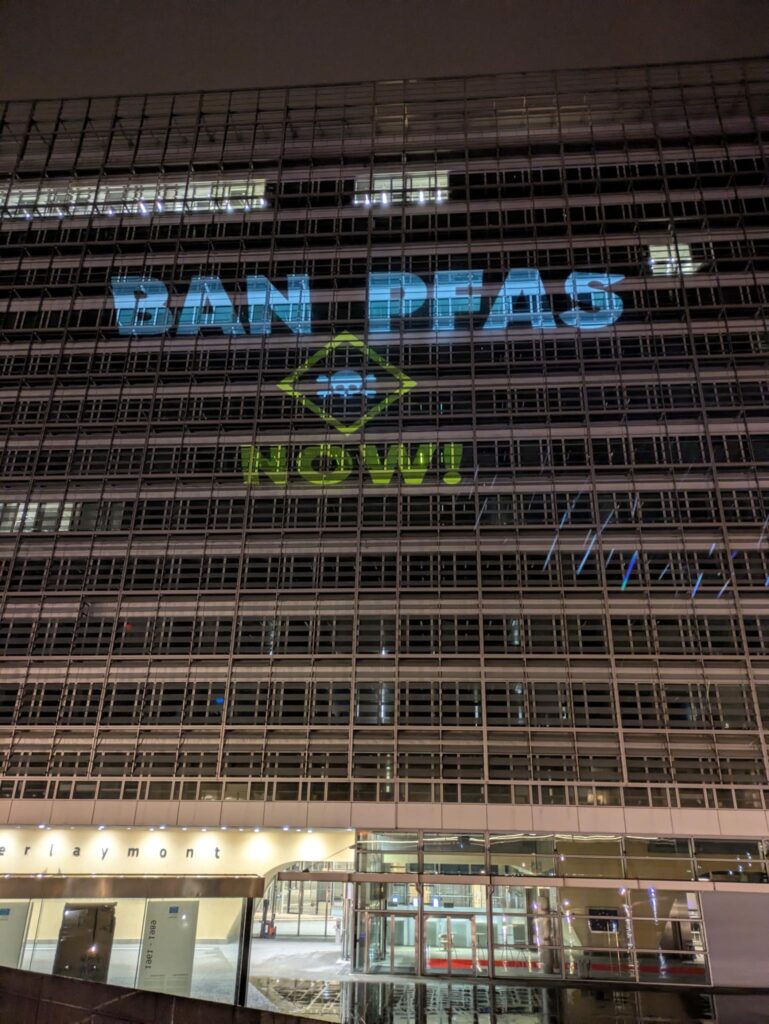
On 31 January 2025, WeMove Europe and several organisations projected our remediation cost evaluation on the outer wall of the EU Commission’s headquarters in Brussels, Belgium (© WeMove Europe).
Impact in political forums and in policy-making
In January 2025, after the publication of our stories, the Green parties in Brussels, France and Switzerland published concerned statements. “Cleaning up PFAS from the environment will be very costly”, reacted EU Environment Commissioner Jessika Roswall on LinkedIn.
Still in January, while the Swiss Green Party launched a petition to ban PFAS in Switzerland, Swedish Members of Parliament summoned the Climate and Environment minister to discuss our investigation. In May, a Parliamentary seminar was held at the Swedish Parliament, specifically dedicated to the Forever Lobbying Project.
The work published by our Watershed colleagues in The Guardian has had a major impact in the UK. After a Parliamentary inquiry into PFAS was launched in spring by the Environmental Audit Committee, the Government accepted in July the recommendations of an Independent Water Commission on PFAS for reforms to improve the water sector regulatory system in England and Wales.
At the European Parliament, while written questions were asked to the EU Commission in February 2025 on the lack of information on PFAS pollution in Greece, public discussions have been organised, such as a debate at the Environment Committee in April and a roundtable on PFAS pesticides and TFA contamination in Europe’s water sources in March.
Materialising the public concern, the Danish presidency of the EU asked 24 ministers in charge of Environment and Climate issues from 19 European countries, including Jessika Roswall and Danish Environment Minister Magnus Heunicke, to test for PFAS in their blood. In October 2025, the results showed half of them had PFAS levels beyond which health impacts cannot be ruled out.
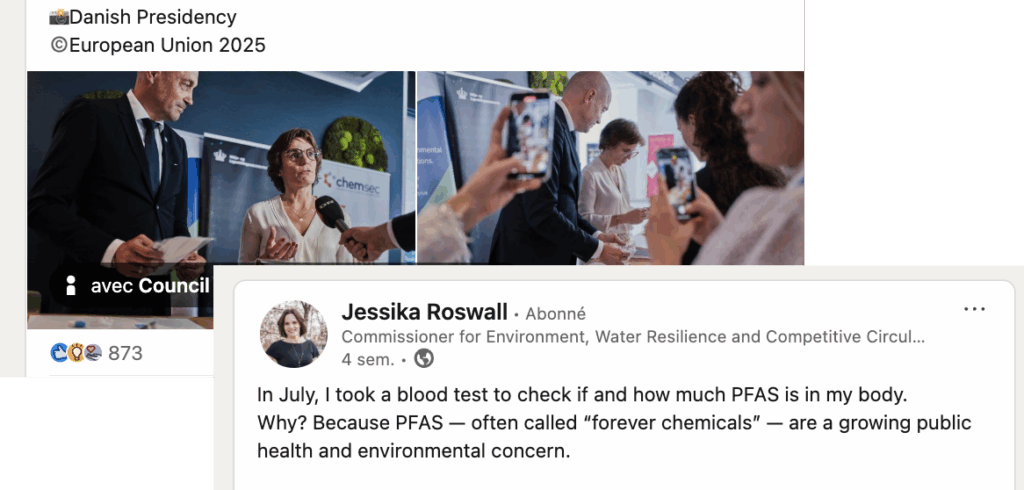
Screenshot of Jessica Roswall’s LinkedIn Post
On 20 February 2025, France became the first EU country to approve a national partial ban on PFAS in cosmetics, shoes, clothing and ski wax. They were followed by Denmark, where a national ban on PFAS in clothing, footwear, and consumer-use impregnation sprays entered into force on 1st July. Shortly after, Denmark suspended the authorisation of 23 PFAS pesticides containing six active substances that can degrade into TFA and contaminate groundwater. In early September, Belgian Environment Minister Jean-Luc Crucke announced a proposal to ban “certain categories of products from the Belgian market” to tackle PFAS pollution.
On 29 January 2026, a EU-commissioned report evaluated that the cost of PFAS pollution in Europe up to €1.7 trillion, confirming the Project’s evaluation. Our work is mentioned no less than 140 times in the study. Our PFAS remediation cost evaluation has been mentioned in several other official EU documents, such as the European Water Resilience Strategy and a briefing of the European Parliamentary Research Service, “Targeted scrutiny of the EU chemicals strategy for sustainability”.
Civil society takes over
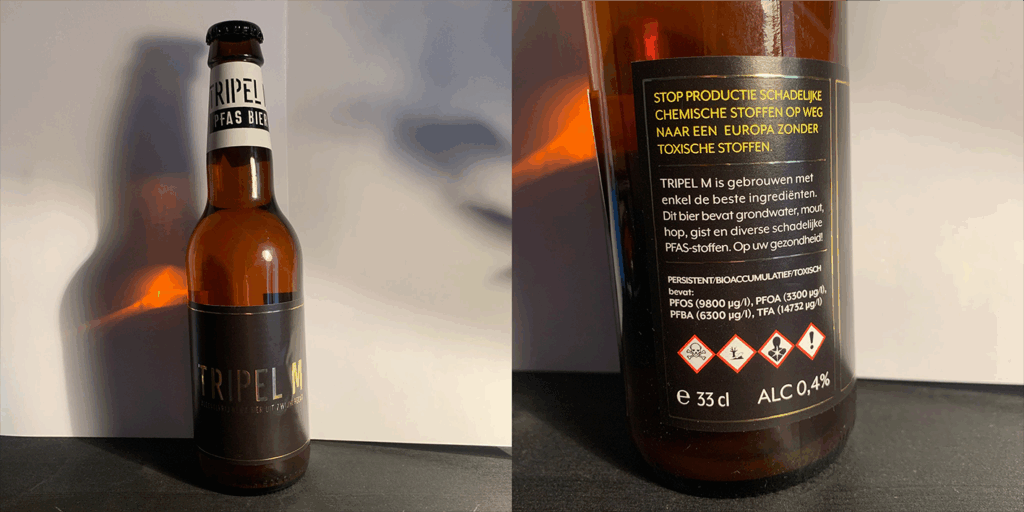
PFAS craft beer, freshly brewed with groundwater contaminated with PFAS from the 3M facility in Zwijndrecht, Belgium (© Forever Lobbying Project).
Quite a number of civil society organisations (CSOs) are now committed to working on the PFAS crisis, supporting frontline communities and putting pressure on decision makers to regulate forever chemicals.
Soon after our publication, 94 CSOs sent a letter to the president of the EU Commission, Ursula von der Leyen, saying, “It’s time to end ‘the worst pollution crisis in human history’: Ban PFAS”. Supported by CSOs, PFAS pollution-affected communities demanded to be heard by Ursula von der Leyen. The president of the EU Commission also received a letter from a large group of healthcare professionals, “concerned that PFAS exposure may be causing various such diseases in our patients, too”.
On the night of 31 January 2025, a coalition of CSOs led by WeMove Europe projected the findings of our investigation onto the outer wall of the European Commission headquarters and demanded ‘BAN PFAS NOW’.
In January and February, open letters were sent by 58 Italian CSOs to prime minister Giorgia Meloni and by Belgian associations to the ministers working on PFAS pollution, while 34 French CSOs called for “swift action against PFAS”. In Italy, the “Mamme no PFAS” movement set up an action camp outside of the tribunal where the Miteni PFAS court case was being held.
Victims of PFAS pollution demonstrated in Pierre-Bénite and Salindres in France, and CSOs showed up with placards outside the headquarters of the German Chemical Industry Association (VCI) in Frankfurt, Germany. In Zwijndrecht, Belgium, PFAS beers brewed with highly contaminated groundwater were distributed to chemical industry workers driving to work at the chemical port of Antwerp. On 18 January, residents affected by the PFAS pollution caused by Chemours in Dordrecht, the Netherlands, protested for the 250th time at the facility’s gates.
During autumn, several PFAS events and conferences were held in Brussels by various actors, including the event “Addressing the Staggering Costs of PFAS Pollution”, organised by the European Environmental Bureau, where Hans-Peter Arp, professor of Environmental Chemistry at the Norwegian University of Science and Technology and member of our expert group, presented our cost calculation.
Recognition and discussion in journalism forums
Our investigation has been mentioned in numerous media all across Europe and beyond, and the team’s journalists have been interviewed in all types of outlets, from the Canary Islands radio to TV channel Al Jazeera and BBC Radio 4.
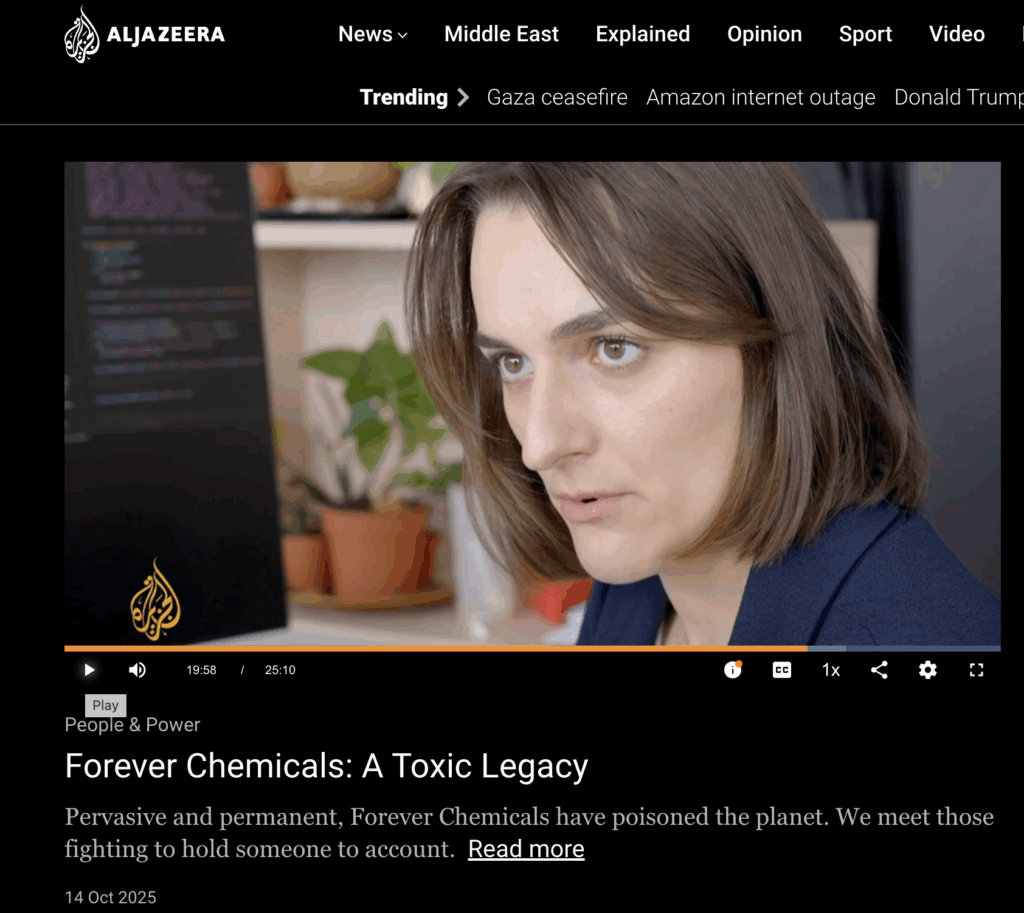
Raphaëlle Aubert (Le Monde), interviewed in an Al Jazeera programme, October 2025.
In October 2025, our “Expert-Reviewed Journalism” methodology, that we have developed throughout our two projects in 2022-2025, has turned into a €1.68 million programme to empower rigorous journalism. Launched by Journalismfund Europe, who funded our work, and the Stockholm School of Economics in Riga (SSE Riga), the initiative “will connect academics, industry professionals, and subject matter experts with local, regional, national media organisations, and investigative journalists to foster multidisciplinary collaboration and excellence”.
As of November 2025, the project has won the Helen Darbishire Award, created in 2024 by Access Info, an organisation that works to promote transparency and access to information. Access Info manages the Ask The EU website, which automates the tracking of requests for freedom of information requests to EU institutions. “Access to information is not just a legal right – it’s a tool for environmental justice. By exposing how industry lobbyists sought to shape EU policy behind closed doors, the Forever Lobbying Project has strengthened democratic accountability and sparked public debate on a threat that endangers ecosystems, human health, and future generations”, said Rachel Hanna, Director of Access Info Europe.
In October 2025, the Project was a finalist of the Daphne Caruana Galicia Prize of the European parliament.
In an interview with the project’s coordinator, Stéphane Horel, in February 2025, the Global Investigative Journalism Network (GIJN) highlighted our Forever team’s work as “Exposing Industrial Pollution and Creating the ‘Forever Chemicals’ Beat”.
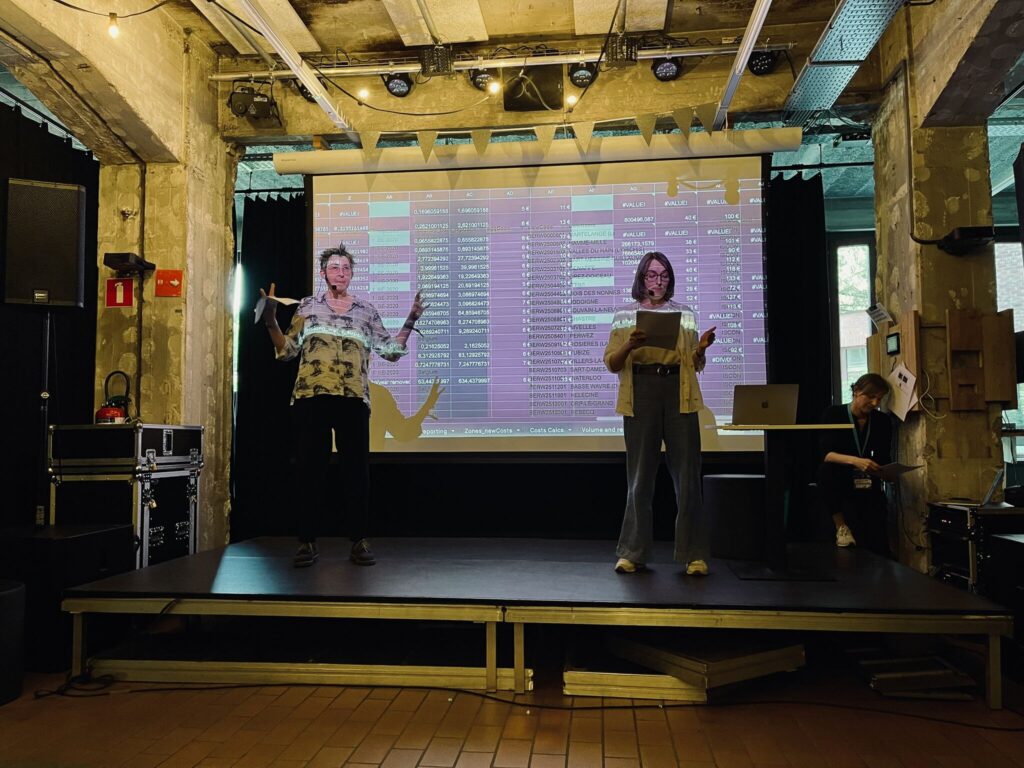
Live Journalism performance at Daharvest by Stéphane Horel & Raphaëlle Aubert, May 2025 (© Arena for Journalism in Europe).
The journalists have presented the project in many journalism forums, including:
– Science & Médias, the annual conference on scientific journalism in France, where Stéphane Horel talked about the investigation and the Expert-Reviewed Journalism methodology (Paris, France, 28 March 2025).
– Gräv, the annual Swedish investigative journalism conference, where Aleksandra Pogorzelska and Daniel Värjö talked about how the team worked on the cross-border investigation and what public impact the Forever Lobbying Project had been having (Borlänge, Sweden, 11 April 2025).
– International Journalism Festival, where Stéphane Horel participated in a panel discussion about how journalists can investigate corporate tactics to influence public opinion and behaviour, with the Forever Lobbying Project as an example of reporting on the plastics and chemical industry (Perugia, Italy, 11 April 2025).
– Dataharvest, the most relevant annual conference on data, investigative and collaborative journalism in Europe, where Raphaëlle Aubert and Stéphane Horel presented the results and the how-to of the investigation, also discussing the Expert-Reviewed Journalism methodology. Raphaëlle and Stéphane also did a live journalism performance on the project on stage, co-produced by team member Jose Miguel Calatayud and Christine Liehr, co-founder of Headliner (Mechelen, Belgium, 24 May 2025).
– Festival International de Journalisme (International Journalism Festival), where Stéphane Horel presented the Forever Lobbying Project as a successful case of cross-border collaborative journalism to investigate cross-border corporate lobbying tactics (Couthures-sur-Garonne, France, 13 July 2025).
– DIG Festival on investigative reporting, where Marta Friggerio participated in a panel discussion about how investigative journalism can uncover environmental crime, with the Forever Lobbying Project as an example (Modena, Italy, 26 September 2025).
– Climate Arena Conference, an annual gathering of investigative journalists and scientists to discuss research on climate issues, where Stéphane Horel participated in a panel discussion about how journalists, activists and other civil society actors can work together, with the Forever Lobbying Project being a prime example of such collaborations (Budapest, Hungary, 11 October 2025).
– Global Investigative Journalism Conference, where Stéphane Horel participated in a panel discussion about how investigative journalism can help uncover corporate tactics that undermine public health regulations worldwide (Kuala Lumpur, Malaysia, 21 November 2025).
Outreach in expert circles
Together with two scientists of the project’s Expert Group, Ali Ling (professor of Civil Engineering at the University of St. Thomas, in Minnesota in the US) and Hans-Peter Arp (professor of Environmental Chemistry at the Norwegian University of Science and Technology), we have submitted a scientific paper detailing our methodology to evaluate PFAS remediation costs to a peer-reviewed journal. In April 2024, we published the methodology of the Forever Pollution Project in the leading journal on environmental pollution, Environmental Science & Technology. In June 2025, we published a summary of both projects in the Annales d’endocrinologie, “Forever Pollution Project: Exposing the real cost of per- and polyfluoroalkyl substances (PFAS) pollution on the environment, science, and politics with cross-border investigation”.
Our journalists are being invited to give presentations in academic and scientific circles, such as:
– POP Contaminated Sites: New Guidance for Sustainable Remediation | Road to 2025 BRS COPs (March 2025)
– French National Institute for Industrial Environment and Risks (Ineris), France (March 2025)
– Side event of the Basel Rotterdam Stockholm Conventions COP, “Leveraging publicly available data for national POPs inventories and the need for POPs data management systems”, Geneva, Switzerland (April 2025)
– 67th H. P. Klotz International Clinical Endocrinology Days, Paris (June 2025)
– UPenn’s Wharton-Lauder institute’s MBA program, University of Pennsylvania in France, Paris (June 2025)
– Baltic sea PFAS network (June 2025)
– Open Government Partnership Summit, Spain (October 2025)
– ZeroPM’s third international workshop in Mytilene, Greece (October 2025)
– “Corporate & White Collar Crime and Governance”, Master (and research master) in Criminology, directed by Liselot Bisschop, a member of our project’s expert group, Erasmus University Rotterdam (December 2025)
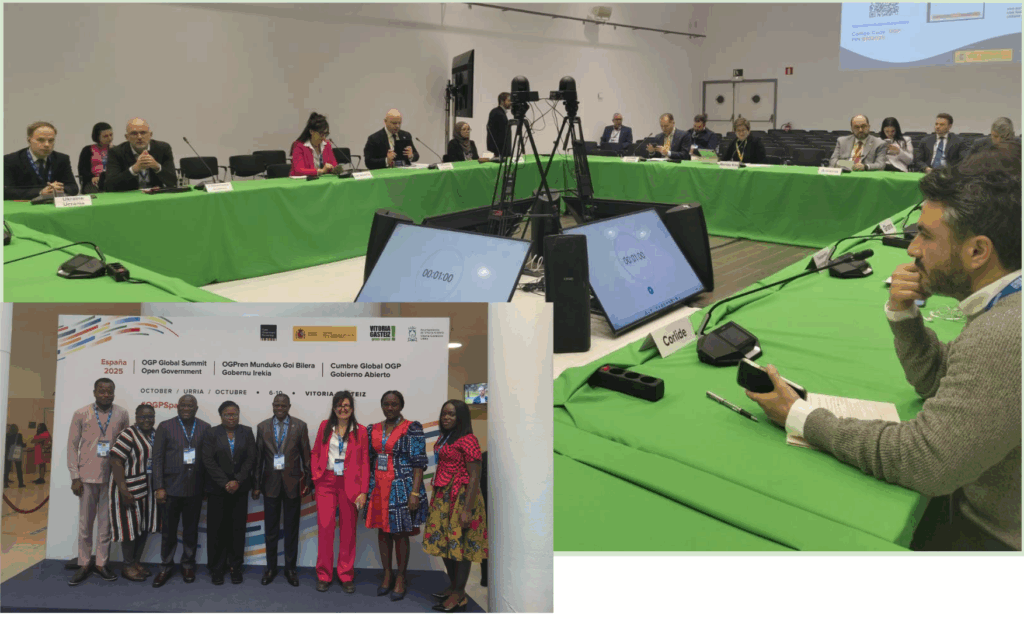
Our team member Ana Tudela (DATADISTA), third from the right, presenting at the Open Government Partnership Summit, Spain (October 2025) (© Forever Lobbying Project).
Public outreach
The team’s journalists are also being invited to participate in public discussions such as:
– Dagens ETC readers’ festival – Solfesten, Katrineholm, Sweden (May 2025).
– International graduate student seminar, University of the Aegean/MESPOM, Mytilene, Greece (May 2025).
– Roundtable “Information in resistance“, organised at the Francofolies Festival in partnership with the La Rochelle University Foundation and co-hosted by Paloma Moritz and Cyril Dion. With folk singer Voyou and Salomé Saqué, La Rochelle, France (July 2025).
– Interview with the Youth Council of Occitanie on the Wild Bus Radio Campus 47 (July 2025).
– PFAS and pesticides in our water: what are the consequences for human health and what are the solutions? With Laurence Huc, toxicologist et Research Director at the French Research Institute for Agriculture, Food and the Environment (INRAE) and the French Institute of Health and Medical Research (Inserm); and Gauthier Eppe, Professor of Analytical Chemistry at ULiège, Liège, Belgium (September 2025).
– Masterclass on the regulation of toxics to the students in Public health master, CHU Liège. With Laurence Huc, toxicologist (September 2025).
– Seminar course on ‘Action for change’ at the Free University of Brussels (ULB), Belgium (October 2025).
– Interface Study day at the Ecole Normale Supérieure de Lyon. With Jacob de Boer, Professor of Environmental Chemistry and Toxicology, Vrije Universiteit Amsterdam, Marie-Charlotte Garin, Deputy of Lyon, Stanislas Pouradier Duteil, CTO Veolia Eau France, Lyon, France (December 2025).
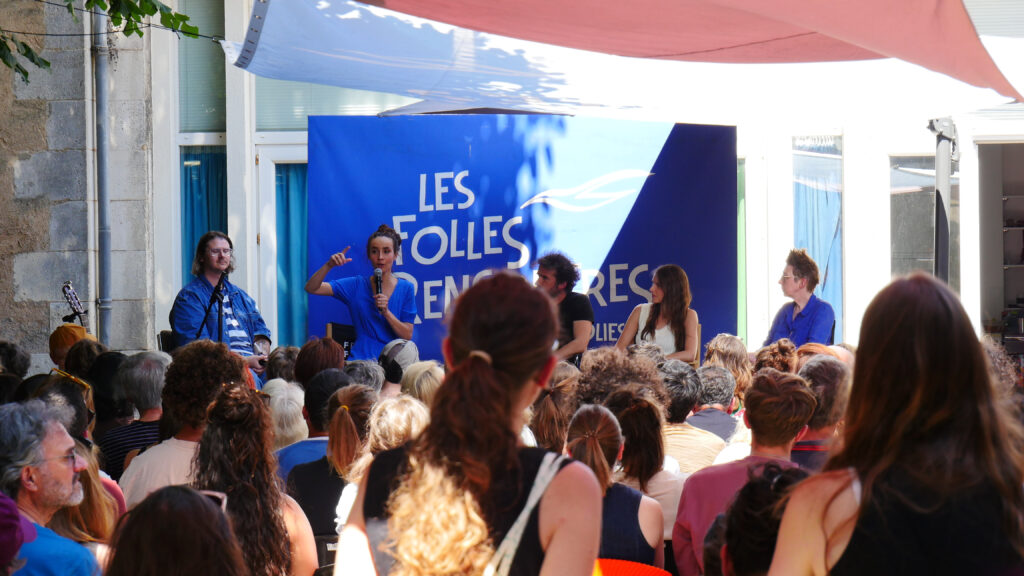
Citizen conference at the Francofolies Festival. From left to right: folk singer Voyou, Salomé Saqué, co-hosts Paloma Moritz and Cyril Dion, Stéphane Horel, La Rochelle, France, July 2025 (© Les Pandas Roux).
